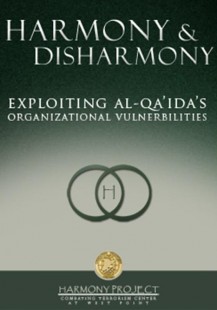In the text of newly-released al-Qa’ida documents captured during recent operations in support of the Global War on Terror and maintained in the Department of Defense’s Harmony database, readers will see how explicit al-Qa’ida has been in its internal discussions covering a range of organizational issues, particularly regarding the internal structure and functioning of the movement as well as with tensions that emerged within the leadership.
The first part of the report draws on scholarly approaches including organization and agency theory, to predict where we should expect terrorist groups to face their greatest challenges in conducting operations. This theoretical framework is informed as much as possible by the captured documents, and provides a foundation upon which scholars can build as more of these documents are declassified and released to the public.
Our analysis stresses that, by their nature, terrorist organizations such as al-Qa’ida face difficulties in almost any operational environment, particularly in terms of maintaining situational awareness, controlling the use of violence to achieve specified political ends, and preventing local authorities from degrading the group’s capabilities. But they also face problems common to other types of organizations.
Agency problems created by the divergent preferences among terrorist group members present operational challenges, which can be exploited as part of a comprehensive counterterrorism strategy. Understanding a terrorist organization’s internal challenges and vulnerabilities is key to developing effective—and efficient—responses to the threats they pose and to degrade these groups’ ability to kill. The captured al Qa’ida documents contribute significantly to this type of understanding.
The analysis contained in this report emphasizes that effective strategies to combat threats posed by al-Qa’ida will create and exacerbate schisms within its membership. Members have different goals and objectives, and preferred strategies for achieving these ends. Defining and exploiting existing fissures within al-Qa’ida as a broadly defined organization must reflect this intra-organizational variation in preferences and commitment in order to efficiently bring all available resources to bear in degrading its potential threat. Many of our prescriptions are intended to induce debilitating problems that increase existing organizational dysfunction and reduce al-Qa’ida’s potential for political impact.
This theoretically informed analysis, along with assessments of the individual captured documents themselves, contributes to existing bodies of research on al-Qa’ida. It provides several tools for identifying and exacerbating existing fissures as well as locating new insertion points for counterterrorism operations. It presents an analytical model that we hope lays the foundation for a more intellectually informed approach to counterterrorism. And perhaps, most importantly, this assessment demonstrates the integral role that scholars can play in understanding the nature of this movement and in generating smarter, more effective ways to impede its growth and nurture the means for its eventual disintegration.
 Skip to content
Skip to content

